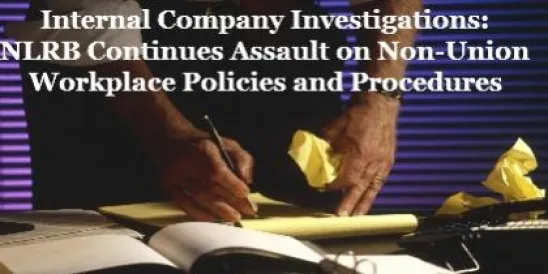The National Labor Relations Board’s aggressive attack on employment policies and procedures outside the union workplace continues in earnest. Over the past several months, the NLRB’s Acting General Counsel has issued a series of “guidance memoranda” intended to reign in employers’ social media policies and practices. Since February 2012, the agency has demonstrated increased scrutiny of heretofore commonly accepted at-will employment disclaimers in employee handbooks, concluding such provisions could be construed as a limitation of an employee’s rights to engage in concerted activity.
On July 30, 2012, that trend continued with the NLRB’s decision in Banner Health System, 358 NLRB No. 93 (2012), which further extends the reach of the National Labor Relations Act into the realm of internal workplace policies via investigations of employee misconduct.
In Banner Health Systems, the employer followed a practice routinely used in internal company investigations by asking involved employees not to discuss the matter with their co-workers while the investigation was ongoing. According to the Administrative Law Judge, the human resource officer conducting the investigation at issue had merely made the request as “a suggestion” which was intended solely to protect the integrity of the investigation, and was unaccompanied by any threat of discipline or other adverse action. The Judge found that, under those circumstances, Banner Health’s practice did not interfere with the employee’s Section 7 rights to participate in concerted activity.
In a 2 to 1, vote, the NLRB reversed. To justify any prohibition on employee discussion of ongoing investigations, it reasoned, an employer must show that it has a legitimate business justification that outweighs employees’ Section 7 rights. Rejecting the ALJ’s finding that Banner Health’s routine instruction was justified by its concern with protecting the integrity of the investigation, the Board concluded that, in order to minimize the impact on Section 7 rights, it was the employer’s burden to first determine whether, in any given investigation, (1) witnesses need protection; (2) evidence is in danger of being destroyed; (3) testimony is in danger of being fabricated; and, (4) there is “a need to prevent a cover up.” (citing Hyundai American Shipping Agency, 357 NLRB 80 (2011)). By not considering these factors on a case-by-case basis, and instead maintaining and applying a blanket rule prohibiting employees from discussing ongoing investigations of employee misconduct, an employer will be found in violation of Section 8(a)(1) of the Act.
In reaching its decision the majority swept aside the ALJ’s conclusion that Banner Health’s policy and practice was not an actual rule, but rather a mere suggestion to employees. However characterized, said the majority, it had a reasonable tendency to coerce employees, and so constituted an unlawful restraint of Section 7 rights. Similarly, the Board rejected the argument that no violation could be found in the absence of threatened discipline for violation of the instruction, concluding that the Act does not require that a rule contain a direct or specific threat of discipline in order to be found unlawful.
Consistent with Banner Health, all employers should closely review their policies and practices governing the conduct of internal investigations, and eliminate from the process any component which includes a blanket instruction, request or plea that complaining employees or other witnesses refrain from communicating about the issue with co-workers. If an employer believes that confidentiality is in fact required so as to maintain the integrity of an internal investigation in a particular case, it should do so with an eye toward the four factors identified by the NLRB, and adequately document its rationale in addressing those concerns.



 />i
/>i
